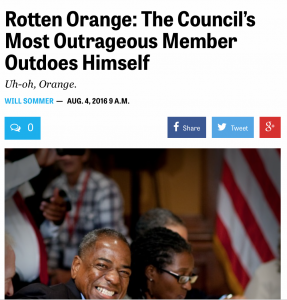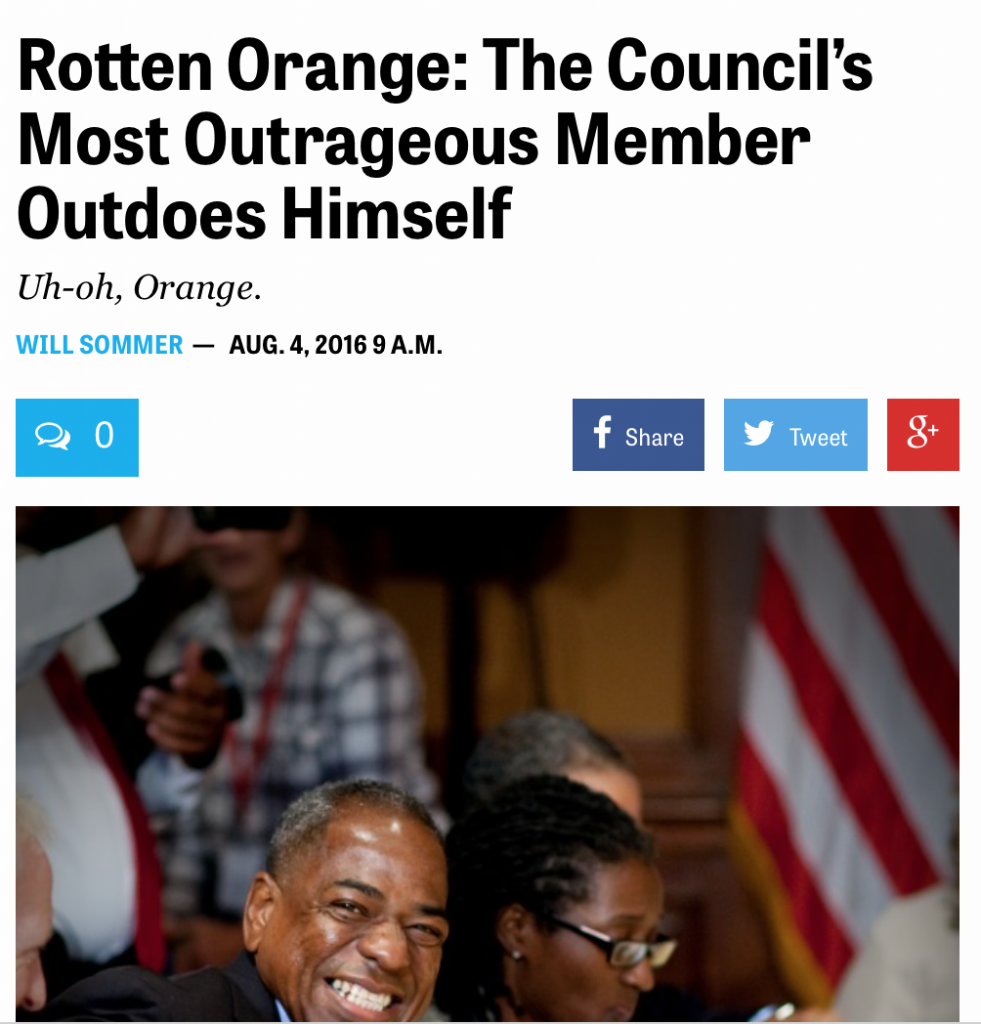 Today is Vincent Orange’s first official day heading up the D.C. Chamber of Commerce. It’s also his last as a member of the D.C. Council. The latter is not by choice.
Today is Vincent Orange’s first official day heading up the D.C. Chamber of Commerce. It’s also his last as a member of the D.C. Council. The latter is not by choice.
Orange, who lost his reelection bid in June, was supposed to serve on the Council into January. But his plan to simultaneously serve as councilmember and D.C. Chamber president for the remaining five months of his Council term sparked a firestorm, leading to his early resignation.
The D.C. Chamber of Commerce is D.C.’s leading business lobby group.
Tonight, honored 2 b named ChiefExecutiveOfficer & President of District of Columbia Chamber of Commerce @dcchamber pic.twitter.com/dfPCK8czbS
— Hon. Vincent Orange (@VOrangeDC) July 28, 2016
It’s “almost stunningly incomprehensible,” said Councilmember Mary Cheh.
“It looks bad,” said Councilmember Brianne Nadeau.
Until recently Orange chaired the Committee on Business, Consumer and Regulatory Affairs.
“You can’t chair the committee that oversees your employer,” said Councilmember Charles Allen.
Local newspapers weighed in, too.
“The only good solution here is for him to resign immediately from public office,” declared the Washington Business Journal.
The Northwest Current and Washington Post also called on Orange to resign.
Yet none of these papers called for a ban on outside employment, despite councilmembers earning $135,000 a year.
Orange isn’t the only councilmember whose outside employment raises flags, but others haven’t received the same scrutiny.
The Post actually blessed the practice of councilmembers holding down outside jobs while scolding Orange for “failing to appreciate that working for a law firm with discreet clients… is different” than heading up the Chamber.
The Post was referring to Councilmember Jack Evans, who has long held outside employment at law and lobby firms. For years the Post has turned a blind eye as Evans’ “discreet clients” benefitted from his official acts.
“You can’t pick and choose who gets to have outside employment,” Orange told WAMU.
In addition to Evans, Orange pointed to Cheh, who earns over $100,000 as a George Washington University law professor (and has reported earning over $200,000 in past years); and former Councilmember David Catania, who received a second six-figure salary from M.C. Dean, a company which has received more than $130 million in contracts with the District.
“What I don’t understand is the double standard,” Orange told the Post.
(City Paper went so far as to jokingly compare Orange to Kim Jong Il in its recent story Rotten Orange.)
‘Full-time and Lucrative’
For Evans, it’s not a problem for a public official to be on the payroll of a private corporation. “The councilmembers who’ve had outside [employment] in my view have been the better councilmembers,” he told WAMU.
Craig Holman of Public Citizen isn’t sold on the practice. “The very integrity of government is placed in danger by allowing councilmembers to receive significant outside income,” he said.
For D.C. councilmembers, who receive “a full-time and lucrative salary,” there should be no need for outside income, said Holman.
Indeed only L.A. and N.Y. pay their city councils more, and both are full-time. (N.Y. City adopted tight restrictions on outside income earlier this year.)
“While outside employment does not always present conflicts of interest,” said Keshini Ladduwahetty of D.C. for Democracy, “it seems far simpler to exclude [it] altogether.”
A growing number of councilmembers agree.
“I’ve been pretty consistent on this issue,” said Allen, “I think it’s a full time job.”
“Given we are both a city council and a state legislature that meets year round,” said Councilmember Elissa Silverman, “I consider being a councilmember a full-time job.”

